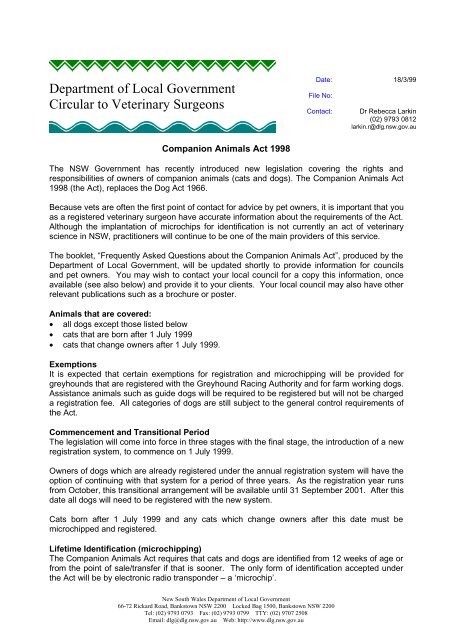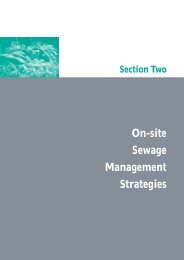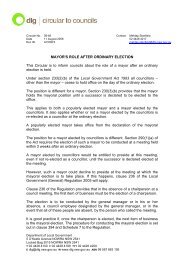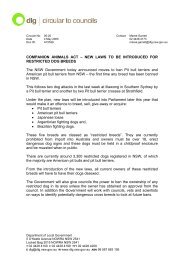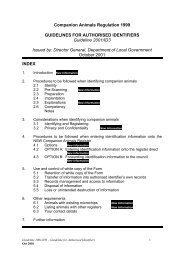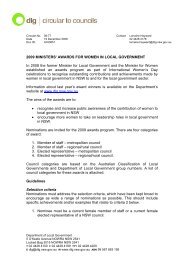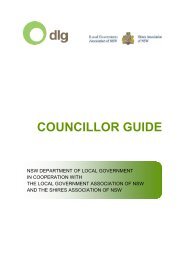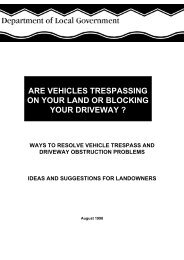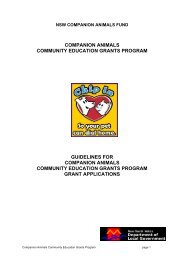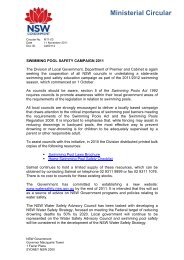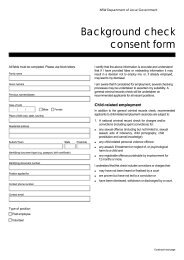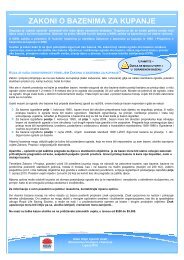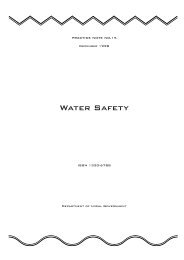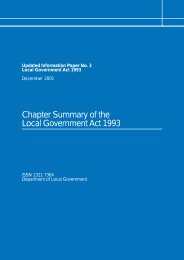Circular to Veterinary Surgeons - Division of Local Government ...
Circular to Veterinary Surgeons - Division of Local Government ...
Circular to Veterinary Surgeons - Division of Local Government ...
Create successful ePaper yourself
Turn your PDF publications into a flip-book with our unique Google optimized e-Paper software.
Department <strong>of</strong> <strong>Local</strong> <strong>Government</strong><strong>Circular</strong> <strong>to</strong> <strong>Veterinary</strong> <strong>Surgeons</strong>Companion Animals Act 1998Date:File No:Contact:18/3/99Dr Rebecca Larkin(02) 9793 0812larkin.r@dlg.nsw.gov.auThe NSW <strong>Government</strong> has recently introduced new legislation covering the rights andresponsibilities <strong>of</strong> owners <strong>of</strong> companion animals (cats and dogs). The Companion Animals Act1998 (the Act), replaces the Dog Act 1966.Because vets are <strong>of</strong>ten the first point <strong>of</strong> contact for advice by pet owners, it is important that youas a registered veterinary surgeon have accurate information about the requirements <strong>of</strong> the Act.Although the implantation <strong>of</strong> microchips for identification is not currently an act <strong>of</strong> veterinaryscience in NSW, practitioners will continue <strong>to</strong> be one <strong>of</strong> the main providers <strong>of</strong> this service.The booklet, “Frequently Asked Questions about the Companion Animals Act”, produced by theDepartment <strong>of</strong> <strong>Local</strong> <strong>Government</strong>, will be updated shortly <strong>to</strong> provide information for councilsand pet owners. You may wish <strong>to</strong> contact your local council for a copy this information, onceavailable (see also below) and provide it <strong>to</strong> your clients. Your local council may also have otherrelevant publications such as a brochure or poster.Animals that are covered:• all dogs except those listed below• cats that are born after 1 July 1999• cats that change owners after 1 July 1999.ExemptionsIt is expected that certain exemptions for registration and microchipping will be provided forgreyhounds that are registered with the Greyhound Racing Authority and for farm working dogs.Assistance animals such as guide dogs will be required <strong>to</strong> be registered but will not be chargeda registration fee. All categories <strong>of</strong> dogs are still subject <strong>to</strong> the general control requirements <strong>of</strong>the Act.Commencement and Transitional PeriodThe legislation will come in<strong>to</strong> force in three stages with the final stage, the introduction <strong>of</strong> a newregistration system, <strong>to</strong> commence on 1 July 1999.Owners <strong>of</strong> dogs which are already registered under the annual registration system will have theoption <strong>of</strong> continuing with that system for a period <strong>of</strong> three years. As the registration year runsfrom Oc<strong>to</strong>ber, this transitional arrangement will be available until 31 September 2001. After thisdate all dogs will need <strong>to</strong> be registered with the new system.Cats born after 1 July 1999 and any cats which change owners after this date must bemicrochipped and registered.Lifetime Identification (microchipping)The Companion Animals Act requires that cats and dogs are identified from 12 weeks <strong>of</strong> age orfrom the point <strong>of</strong> sale/transfer if that is sooner. The only form <strong>of</strong> identification accepted underthe Act will be by electronic radio transponder – a ‘microchip’.New South Wales Department <strong>of</strong> <strong>Local</strong> <strong>Government</strong>66-72 Rickard Road, Banks<strong>to</strong>wn NSW 2200 Locked Bag 1500, Banks<strong>to</strong>wn NSW 2200Tel: (02) 9793 0793 Fax: (02) 9793 0799 TTY: (02) 9707 2508Email: dlg@dlg.nsw.gov.au Web: http://www.dlg.nsw.gov.au
2The Australian Standard for microchip readers is currently being developed and should comein<strong>to</strong> effect in the first half <strong>of</strong> 1999. It is based on the International Standards Organisation (ISO)standard. Implanters in NSW will be required <strong>to</strong> comply with the Australian Standard. However,all existing microchip systems currently in use in Australia will be recognised for thelifetime <strong>of</strong> that animal.Accreditation <strong>of</strong> Microchip ImplantersIt is proposed that all registered veterinary surgeons in NSW will be approved. Others, such ascouncils or animal welfare organisations, will be required by the new Regulation (see below) <strong>to</strong>have appropriate training and be approved. The new Regulation will define the procedure <strong>to</strong> beused for implantation <strong>of</strong> a microchip, for example that prior <strong>to</strong> insertion <strong>of</strong> a chip, the implantermust first scan the animal with a reader or readers <strong>to</strong> assess whether a chip has already beenimplanted in the animal. Veterinarians will be issued with further advice as <strong>to</strong> the exactrequirements for microchipping once the Regulation has been passed.Implanters will be required <strong>to</strong> submit information about the animal and owner <strong>to</strong> a central point– the Companion Animals Register. Owners are responsible for ensuring that the Register isnotified <strong>of</strong> changes <strong>to</strong> this information such as change <strong>of</strong> address or death <strong>of</strong> an animal. TheAct provides penalties for failure <strong>to</strong> do this.Registering Companion Animals with the CouncilCompanion animals are required by the Act <strong>to</strong> be registered once only for the lifetime <strong>of</strong> theanimal from six months <strong>of</strong> age. Animals must be permanently identified (microchipped) beforethey can be registered. The Act allows for a discount in relation <strong>to</strong> de-sexed animals (see Feesbelow). However, it is strongly encouraged that animals are microchipped and registered at thesame time. This will mean that desexing and microchipping at 12 weeks <strong>of</strong> age followed byregistration will be the preferred option.FeesIt is anticipated that lifetime registration fees will be in the region <strong>of</strong> $100 for an entire animal,$35 for a desexed animal, $35 for an entire animal owned by a recognised breeder and $15 fora desexed animal owned by a pensioner. Owners will therefore need some sort <strong>of</strong>documentation from their veterinarian that their animal has been desexed. Fees and chargesassociated with microchip implantation will not be regulated under the Act.Dangerous dogs and nuisance animalsThe Act provides for declaration <strong>of</strong> a dog as ‘dangerous’. People may also be disqualified fromowning a dog. Councils have the authority <strong>to</strong> issue nuisance orders for dogs or cats requiringthat the owner prevent anti-social behaviours such as the animal making a noise or damagingproperty.New Regulation for commentDetails <strong>of</strong> administration <strong>of</strong> the new system will not be finalised until a second Regulation ismade. The Regula<strong>to</strong>ry Impact Statement outlining what is proposed is due for release shortly.Copies will be available from your local council, library or from the Department’s web site atwww.dlg.nsw.gov.au.Further Information Copies <strong>of</strong> the Companion Animals Act and Regulation are available from the <strong>Government</strong>Information Service for $8.40 per copy, ph 02 97437200 or from the web site at www.austlii.edu.au Updated copies <strong>of</strong> the Frequently Asked Questions about the Companion Animals Act will availablefrom your local council or from the Department’s web pages at www.dlg.nsw.gov.auDr Rebecca Larkin, Executive Officer Companion Animals Advisory Board, Department <strong>of</strong> <strong>Local</strong><strong>Government</strong> - 02 97930822


